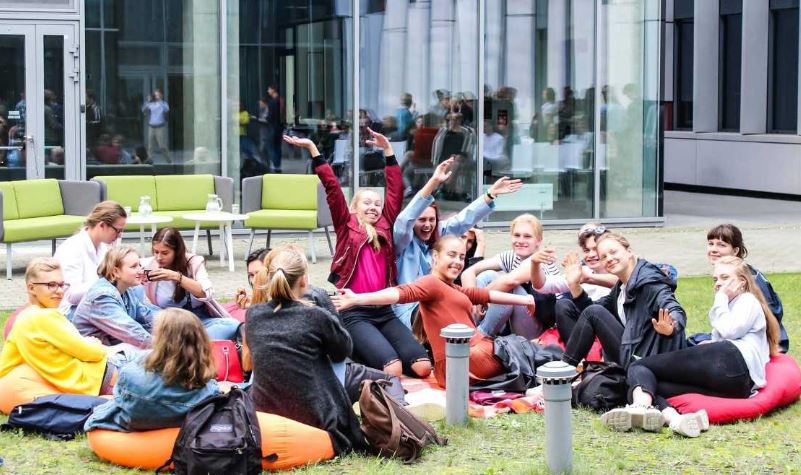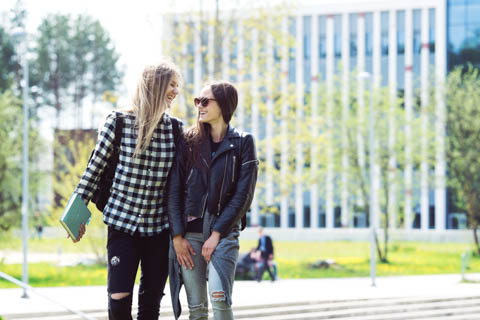|
Coordinator of incoming and outgoing exchange students, Erasmus+ agreements, traineeships, and International Master's degree programmes: Dr. Sigita Mėlynytė |
 |
For Incoming Students
Exchange Students

Traineeships at LSC
For Outgoing Students
Please find more information and links to registration forms and virtual seminars about the studies abroad here: info.
Also, the selection criteria for VU LSC students, along with helpful information, are available below.
Any questions? Please contact VU IRO via email: .
Coordinator at VU LSC for Erasmus exchange programme and traineeships: Sigita Mėlynytė, PhD;
Studies Abroad
All our students are entitled to spend some time studying abroad. The application for studies abroad is open twice a year - in September and in February (except for the ISEP program, which has a single call in November). Please follow the news on the VU IRO webpage.
Erasmus+ exchange
All the detailed instructions and information on the Erasmus+ exchange programme for studies are displayed at VU.lt.
In addition to the general requirements, the Life Sciences Center has additional procedures and criteria.
Description of student exchange procedures at VU LSC
- Who can apply: full-time students of LSC who do not have debts or academic debts, and have completed four semesters (for BSc students) / one semester (for MSc students) before the studies abroad.
- A successful applicant has to fulfill the main VU LSC selection criteria.
- Students are not allowed to study abroad during the last semester of their studies unless the Committee of their study programme has approved it.
- Studies and traineeships abroad cannot last more than 50 per cent of the total study time.
- Students applying for studies abroad must present all the required documents for the selected exchange programme.
VU LSC selection criteria for exchange studies
- The chosen university has to offer similar courses to the study programme;
- Excellent and very good knowledge of the foreign language;
- The weighted average score of your last two semesters must be no less than 7.5;
- Students should not have any debts/academic debts;
- Motivation is clear and related to academic achievements. The motivation is evaluated by VU LSC Erasmus and the international exchange coordinator;
- The Chairperson must approve all the selected courses of the student’s studies programme committee.
If there is more than one applicant for the same exchange university, priority is given to the one with the higher weighted average mark and/or higher mark in the foreign language.
Other Programmes
https://www.vu.lt/en/studies/academic-info-for-students/studies-abroad/study-period-abroad
Traineeships Abroad
All our full-time students can apply for an Erasmus+ traineeship abroad. The traineeship can last from 2 months to a year, but in total, the traineeship and studies abroad cannot exceed 12 months. Applications for Erasmus+ traineeships are open year-round. Erasmus+ coordinator for traineeships at VU LSC: Dr. Sigita Melynyte, e-mail: ;
Some valuable tips on how to find a placement for an Erasmus+ traineeship:
- Please note - finding a placement for a traineeship is a part of the traineeship!
- Look in the field where you would like to improve your knowledge, gain skills, where you would like to try yourself, or maybe where you know you want to establish your career. It is like looking for a job.
- Most of our students apply for traineeships at scientific institutes and university laboratories, but also in the private sector (such as in cosmetics, pharmaceutical companies, etc.) and non-governmental organizations.
- If you find it challenging to get a placement and you are looking to improve your skills in the area of your research project, speak to your supervisor and professors. Most of them are collaborating with scientists abroad and might be able to tell you where to look. Also, check the scientific articles of interest to see the authors’ affiliations and where the studies were conducted.
- Always write a personal letter stating your aims, goals, what skills you would like to master, and why this place could provide all this. Letters with non-specific, general queries are usually ignored.
All the information on Erasmus+ and other professional traineeships can be found here: https://www.vu.lt/en/studies/academic-info-for-students/internships-traineeships.
Cancer Biology Project
Coimbra Group Cancer Biology Project
VU Life Sciences Center, along with some other Coimbra Group Universities, participates in the “Master´s Programme in Cancer Biology”, an initiative of the Life Sciences Working Group (LSWG).
What it is
The proposed action aims to enhance the excellence and competitiveness of our postgraduate/master's students in the life sciences. Thus, the LSWG offers the opportunity for master's students in the field of cancer biology (or related) to develop their practical training/research project (or part of it) at one of the partner universities participating in the Programme. Students can also attend cancer-related lectures at a foreign university during their practical training.
General aims
- To develop active networks in the cancer research area.
- To share training activities and technologies to boost the quality and competitiveness of bio-scientific education and training.
- To introduce students to an interdisciplinary approach to cancer research, from basic to clinical levels.
Who can participate
The purpose of the project is
to help students extend their knowledge and focus their studies and research on
cancer biology. Thus, it is primarily designed for VU LSC MSc Genetics students.
How it works
During this project, students will spend one semester at the partner university, taking the selected courses (designed for this project) and a research project. At least 15 ECTS credits will be allocated for laboratory training, and a minimum of 5 ECTS (ideally 5-10 ECTS) will correspond to the theory courses.
Participating Universities
- Barcelona (Spain),
- Coimbra (Portugal),
- Montpellier (France),
- Pavia (Italy),
- Salamanca (Spain),
- Vilnius (Lithuania),
- Würzburg (Germany).
LSCG_Cancer_Biology_Master_Program_2025-2026_Courses.
For details, please contact the MSc Genetics chairman, Prof. Juozas Rimantas Lazutka.
